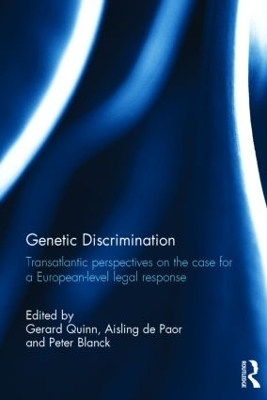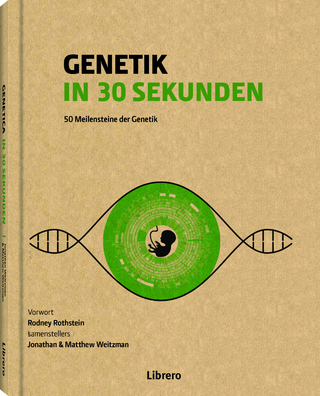
Genetic Discrimination
Routledge (Verlag)
978-0-415-83693-7 (ISBN)
This book explores the different forms and potential uses of genetic testing. Drawing together leading experts in disability law, bioethics, health law and a range of related fields, it highlights the ethical and legal challenges arising as a result of emerging and rapidly advancing genetic science. On examining transatlantic perspectives on the matter, chapters in the book ask whether the US Genetic Information Nondiscrimination Act (GINA) is proving to be an effective tool in addressing the issue of genetic discrimination and alleviating fears of discrimination. The book also reviews what insights may be gained from GINA within employment and health insurance contexts, and asks how the UN Convention on the Rights of Persons with Disabilities (CRPD) may impact similar debates within the European Union. The book focuses particularly on the legislative and policy framework in the European Union, with an emphasis on the gaps in protection and the scope for specific legislative action in this area.
This book will be of great interest to scholars and students of discrimination law, bioethics and disability law, and will be of considerable use to legal practitioners, medical practitioners and policy-makers in this area.
Gerard Quinn is University Professor and Director of the Centre for Disability Law and Policy, National University of Ireland, Galway. Aisling de Paor is Lecturer in Law at Dublin City University. Peter Blanck is University Professor and Chairman of the Burton Blatt Institute at Syracuse University College of Law, USA.
1. Introduction, Aisling de Paor, Gerard Quinn & Peter Blanck Section 1: Advances in Genetic Science and Technology 2. Tracing the History, Evolution and Future Orientation of Genetic Science and Technology, Aisling de Paor & Noel Lowndes Section 2: Ethical and Legal Dilemmas Arising from Emerging Technologies 3. Diversity Ethics and the Impact of Genetic Technologies, Javier Romanach Cabrero 4. Genes, Identity and Clinical Ethics under Conditions of Uncertainty, Rebecca Wolf, Michael Joseph Young, Michael Ashley Stein & Harold J. Bursztajn 5. The Use of Genetic Information Outside of the Therapeutic Health Relationship: An International Perspective, Yann Joly, J. Rosel Kim, Shahad Salman & Ida Ngueng Feze Section 3: The United States Legislative Response 6. U.S. Legislative and Policy Response – Some Historical Context to GINA, Peter Blanck & Aisling de Paor 7. The Genetic Information Non Discrimination Act (GINA) 2008, Anya Prince & Michael Waterstone 8. Genetic Discrimination in the Workplace after GINA, Robert S. Olick Section 4: Building the Case The A European Union Regulatory Response 9. Genetic Discrimination in Insurance: Lessons from Test Achats, James Davey 10. Employment practices in a new genomic era – acknowledging competing rights and striking a balance, Aisling de Paor 11. Medical (Genetic) Examinations for Non- Health Purposes – The Relevance of European Legal Standard Setting, Henriette Roscam Abbing 12. National legal and policy responses to genetic discrimination in Europe: the difficulties of regulation, Ine Van Hoyweghen 13. Genetic Discrimination and the Draft European Union General Data Protection Regulation, Mark Taylor 14. Accommodating Genes: Disability, Discrimination and International Human Rights Law, Janet Lord Section 5: Considering the Way Forward for the EU 15. Genetic discrimination: Is it Time for the EU to take on a New Challenge?, Delia Ferri 16. Conclusion, Aisling de Paor, Gerard Quinn & Peter Blanck
| Zusatzinfo | 1 Tables, black and white |
|---|---|
| Verlagsort | London |
| Sprache | englisch |
| Maße | 156 x 234 mm |
| Gewicht | 566 g |
| Themenwelt | Sachbuch/Ratgeber ► Gesundheit / Leben / Psychologie |
| Naturwissenschaften ► Biologie ► Genetik / Molekularbiologie | |
| Recht / Steuern ► Arbeits- / Sozialrecht ► Arbeitsrecht | |
| Recht / Steuern ► Arbeits- / Sozialrecht ► Sozialrecht | |
| Recht / Steuern ► EU / Internationales Recht | |
| Recht / Steuern ► Privatrecht / Bürgerliches Recht ► Medizinrecht | |
| Sozialwissenschaften ► Soziologie | |
| ISBN-10 | 0-415-83693-X / 041583693X |
| ISBN-13 | 978-0-415-83693-7 / 9780415836937 |
| Zustand | Neuware |
| Informationen gemäß Produktsicherheitsverordnung (GPSR) | |
| Haben Sie eine Frage zum Produkt? |
aus dem Bereich


